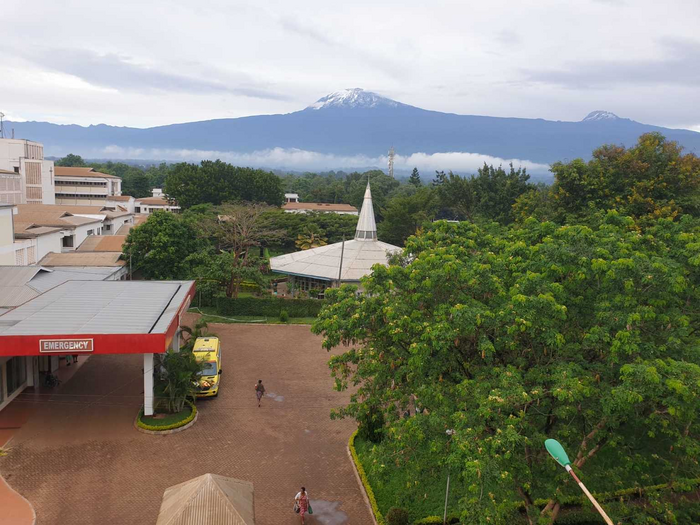DURHAM, N.C. — Rehabilitative care following an injury can often mean the difference between full recovery and a lifetime of complications. But in some low-income countries, barriers such as a lack of access to transportation or even misunderstanding doctors’ orders are preventing many patients from accessing this critical step following an injury.

Credit: Kilimanjaro Christian Medical Centre
DURHAM, N.C. — Rehabilitative care following an injury can often mean the difference between full recovery and a lifetime of complications. But in some low-income countries, barriers such as a lack of access to transportation or even misunderstanding doctors’ orders are preventing many patients from accessing this critical step following an injury.
Trauma researchers at Duke University and the Kilimanjaro Christian Medical Centre (KCMC) in Tanzania followed up with 169 patients who received trauma care at KCMC between August 2018 and January 2020. The research, published June 13 in PLOS Global Public Health, documented patients’ challenges getting to post-trauma appointments, including difficultly finding transportation or childcare.
Other patients skipped appointments because they thought they were supposed to stay in bed, says lead author Anjni Joiner, DO, an assistant professor of surgery at Duke University School of Medicine and an affiliate of the Duke Global Health Institute.
“They were unable to make it to follow-up appointments due to their perceived need to strictly adhere to doctor’s orders for bed rest,” Joiner says. “This is a clear gap in patient education and an opportunity for improvement.”
Injuries are a growing problem in many parts of sub-Saharan Africa. While efforts are underway to expand acute care in many countries, the new research underscores the importance of also ramping up outpatient rehabilitative services, as well as measures to ensure patients can access them.
“Identifying the reasons for poor access to follow-up care and the extent of the challenges patients face are the first steps in creating an intervention to reducing the burden of disabilities on injury victims,” says Joiner, noting that people who suffer injuries are 20 to 50 times more likely to have a permanent disability than they are to die.
More than 80 percent of trauma patients surveyed were male, many of them the sole income earners for their families. Injuries can make it difficult to travel on the two- or three-wheeled vehicles that are common in Tanzania, and many patients said they lacked money to afford taxis to appointments.
As part of the study, researchers have launched a pilot project to give patients vouchers for transportation. “We hope we can develop a sustainable transportation solution for post-injury patients in order to improve their access to rehabilitative services and follow-up care after an injury,” Joiner says.
But the findings point to a “myriad of interventions” needed to support patients in all areas of post-injury care, says Catherine Staton, M.D., a Duke associate professor of surgery and global health who supervised the research.
For example, women who suffered injuries often didn’t come to follow-up appointments because they couldn’t find childcare. Others feared risking reinjury. And some patients said they couldn’t follow doctors recommendations for rest because of family or job responsibilities, says Timothy Antipas Peter, a research assistant at KCMC who oversaw the study’s quantitative analysis.
Duke and KCMC have jointly created the Trauma Research Capacity Building in Kilimanjaro, Tanzania (TRECK) Program, which will train master’s and doctoral students working to improve trauma care across sub-Saharan Africa.
“Trauma leads to a generational, financial impact,” Staton says. “All of the disability reduction interventions are in essence generational investments. We’re trying to get people back to work in order to support their families.”
CITATION: “Barriers to Accessing Follow Up Care in Post-Hospitalized Trauma Patients in Moshi, Tanzania: A Mixed Methods Study,” Anjni Patel Joiner, Anna Tupetz, Timothy Antipas Peter, Julius Raymond, Victoria Gerald Macha, João Ricardo Nickenig Vissoci, Catherine Staton. PLOS Global Public Health, June 13, 2022. DOI: 10.1371/journal.pgph.0000277
ONLINE: https://journals.plos.org/globalpublichealth/article?id=10.1371/journal.pgph.0000277
Journal
PLOS Global Public Health
DOI
10.1371/journal.pgph.0000277
Method of Research
Survey
Subject of Research
People
Article Title
Barriers to Accessing Follow Up Care in Post-Hospitalized Trauma Patients in Moshi, Tanzania: A Mixed Methods Study
Article Publication Date
13-Jun-2022



